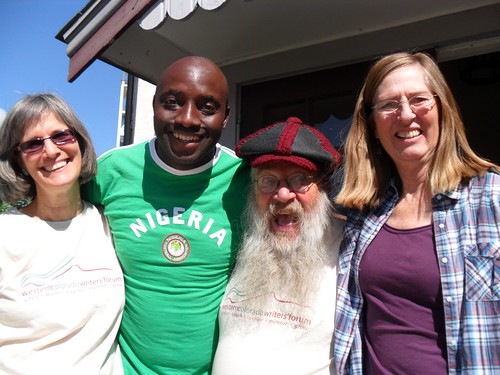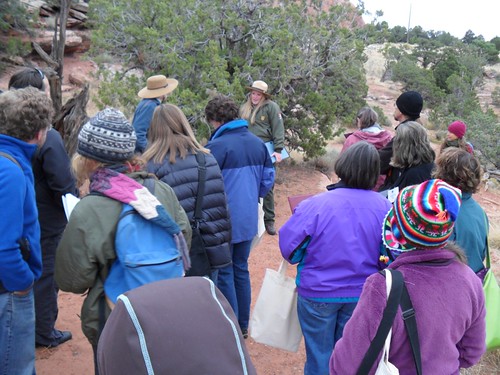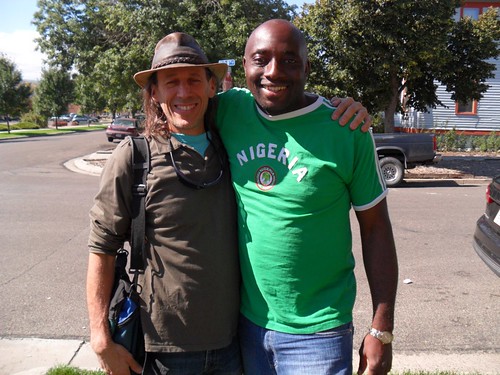This world glistens like a summer lamp saying open, open
In the time it takes to speak, everything could disappear.
—from "Looking for Fossils" by Sandra Dorr (from Desert Water, The Lithic Press, 2009)
What is that spark when you meet a friend, which crackles with instant recognition? And what is that spark multiplied like a moonless night sky's field of fireworks? It might be something like what I experienced at the Western Colorado Writers' Forum's annual conference in Grand Junction this past weekend.

I was introduced to the group by Wendy Videlock, who appeared on TNB Poetry at my behest and who then suggested I lead a workshop on submissions to online journals at the conference. I gave that workshop Saturday to a sharp, attentive group who had just heard María Meléndez's advice about submitting to print journals.
Earlier that morning I had encountered what this conference was really about, at heart.
What better place to call home
than this high desert cloud mesa wrong turn
rippling of the continental plates
before they slap down
fanning towards the Coast?
—from "The Wright Stuff" by Art Goodtimes
I woke up on the crisp, autumn morning to ride with Colorado Poet Laureate David Mason and his sweet, effervescent lover Cally Conan-Davies up Monument Canyon into the sort of jaw-dropping landscape that Colorado offers up to casually. There at the visitor center of the National Monument, a group of poets learned from Park Ranger Liz of the eventful geological and human history of the place, as well as present climate, flora and fauna. Fingers bit by the chill, we nevertheless scribbled scraps of what she said and what figments the vista inspired in us.

We then gathered in a room at the center where David Mason recited selections of poetry which exhibited rootedness to land. He finished with Bristlecone Pine, his own poem written after visiting the oldest tree of that type in the Rocky Mountains; he started with:
We have no prairies
To slice a big sun at evening
Everywhere the eye concedes to
Encroaching horizon, Is wooed into the cyclops' eye
Of a tarn. Our unfenced country
Is bog that keeps crusting
Between the sights of the sun. They've taken the skeleton
Of the Great Irish Elk
out of the peat, set it up
An astounding crate full of air.
—from "Bogland" by Seamus Heaney
I wrote a poem, "Parachuted," that seemed to emerge, great elk skeleton, from the dew-soaked sponge of my brain. I also remembered that beginning of "Bogland" throughout the day, and when one of the organizers urged us to write and share weathergrams to post on Grand junction trees, "Bogland" wove into my offering.

I've since worked that weathergram into a tanka.
We have no tarn toMottle the copperplate faceOf rough entrada.We've no black peat, dry fossilColorado, we repeat.
—untitled, by Uche
There were several fossil-marked rocks at the home of Danny Rosen, professional astronomer, director of the Western Sky Planetarium, poet, and host to a group of us. The first night Danny treated us to jaw-dropping views of the moon, Jupiter and its moons, The Pleiades, The Andromeda galaxy and more through his large telescope. Friday evening I taught a couple of Igbo and Efik songs to Art Goodtimes, San Miguel County commissioner and Western Slope Poet Laureate and Rosemerry Trommer, runner, linguist, singer and proprietress of a large fruit orchard. Rosemerry sang me a few Yoruba songs in turn. From there we joined the chat and debate at Danny's legendary poet's bonfire with Jack Mueller, Wendy, David and Cally.

It wasn’t the moon
that swooned me, but
the edge of the moon,
cratered and rough,
the shadow line
where substance ends
and space begins.
—from "After Watching the Moon through a Telescope Big as I" by Rosemerry Trommer
Plenary sessions were held in a lovely converted church with high, NBC peacock stained glass windows. Highlights included a poetry reading in which I took part, and offerings of words from elders. Saturday night, before the headlining presentation of Leslie Marmon Silko we had a bit of history from Ute elder Clifford Duncan. Sunday morning the conference closed with a series of reminiscences by elderly representatives of various cultures in the local Grand Valley: Hispanic, African American, Basque, Italian, Japanese, etc., as well as from a gentleman telling the history of geology, miners and military installations in the region. I was very impressed at the amount of time, attention and respect given over to those who have known that land the longest, and to their stories.
Maybe that is why we go on talking,
always trying to show someone we're here,
and look--I have a past just like you do,
a stream of words that fills the empty night
and sweetens troubled dreams, or so we hope,
and tells us not to linger long on bridges
staring at all the water passing by.I thought my whole ambition was to make
the past and present come together, dreamed
into a vivid shape that memory
could hold the way the land possesses rivers.
They in turn possess the land and carry it
in one clear stream of thought to drink from
or water gardens with.I learned that I must first talk to myself,
retelling stories, muttering a few
remembered lines of verse, to make the earth
substantial and to bring the sunlight back.
—from "The Country I Remember" by David Mason
Stories were how my long weekend began, as well as how it ended. I arrived at Wendy's household, met and had supper with her charming family, after which Wendy and I discussed lives and poetics, our own, and of others, into the night. Then it was time to sleep, because in the morning Wendy was leading a workshop, "Totem Poems and the Subconscious Muse," which was my first writing workshop, an experience I approached warily because my remote impression of workshops had been rather dire. On the day I enjoyed Wendy's approach, and was very impressed at the quality of poems written by participants. I wrote a couple of poems which seem worthy of further attention, including a leopard poem, which I'm always grateful to receive.
Only bone, like the shadow, knows
that lasting metaphors are born
of architects and alchemists,of those who love the arch
and beam, and of the fleshy need
to leave and have something remain.
—from "In Praise of Form" by Wendy Videlock, from Nevertheless, Able Muse Press, 2011
Sandra Dorr was too busy running the show for me to have much opportunity to hear her poetry, so Desert Water was my first read this week of the many volumes I'd bought at the conference. In the way she switches from the telescope of landscape to the microscope of intimate personal detail, Sandra is like so many of the remarkable poets I met that weekend. Something very special is welling from the ground in Colorado, and I'm excited to be a part of it. I spent about a half hour with Sandra walking to lunch one of the days, and she told me of how she had gotten involved in local literary initiatives, pointing out the many points of artistic interest in the small town of Grand Junction. I have no doubt that her tireless efforts, and that of her collaborators at the WCWF, will continue to bear fruit, and that I'll always be of a mind to witness the resulting magic in person.
See also: